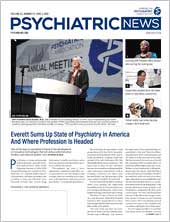The majority of Americans (87 percent) see gun violence as a public health threat, including 77 percent of Republicans and 96 percent of Democrats, according to the results of a national poll released by APA at last month’s Annual Meeting.
A large majority of Americans (85 percent) believe Congress should do more to address the issue of mass shootings, including 76 percent of Republicans and 96 percent of Democrats. Seventy-six percent of Americans said they support the Centers for Disease Control and Prevention (CDC) conducting research on gun violence as a public health issue. A spending bill recently passed by Congress now allows the CDC to conduct such research, but the bill did not provide funding.
Survey respondents were asked if they agree or disagree with the following statement: “Gun violence, including violence from mass shootings, is a public health problem.” Eighty-seven percent said they agree, and 64 percent said they strongly agree.
Americans blame mass shootings on both a lack of access to mental health care and easy access to assault-style weapons. Lack of access to mental health services is seen as a contributing factor to mass shooting violence by 70 percent of Americans.
Here are some other findings that emerged from the survey:
•
Fifty percent of Americans said that lack of access to mental health services and easy access to assault-style guns are equally to blame.
•
Twenty-one percent of Americans believe lack of access to mental health services is more to blame, and an equal percentage believe easy access to assault-style guns is more to blame.
•
African Americans were more likely than Caucasians to blame easy access to guns (28 percent versus 17 percent), and Caucasians were more likely than African Americans to blame lack of access to mental health services (23 percent versus 11 percent).
•
Nearly half of Americans said that people with mental illness are far more likely to be victims of violence than perpetrators of violence (46 percent in 2018, up from 40 percent in 2017 and 37 percent in 2016). This perception is in line with research showing that people with mental illness are more likely to be victims rather than perpetrators of violence.
“This poll reflects Americans’ overall concern about gun safety and presents a strong call to action to address gun violence as a public health issue,” said APA CEO and Medical Director Saul Levin, M.D., M.P.A. “Key to taking effective action to prevent gun violence will be better understanding the issues through research, which happens to be supported by most Americans.” ■
